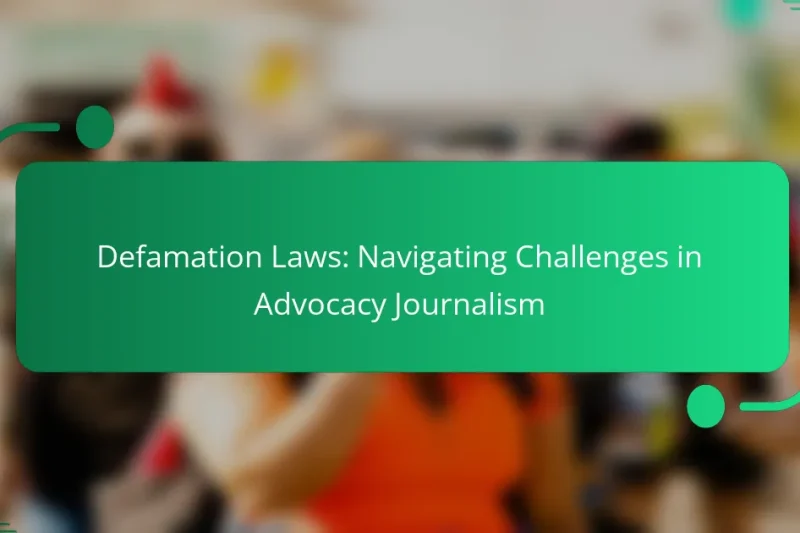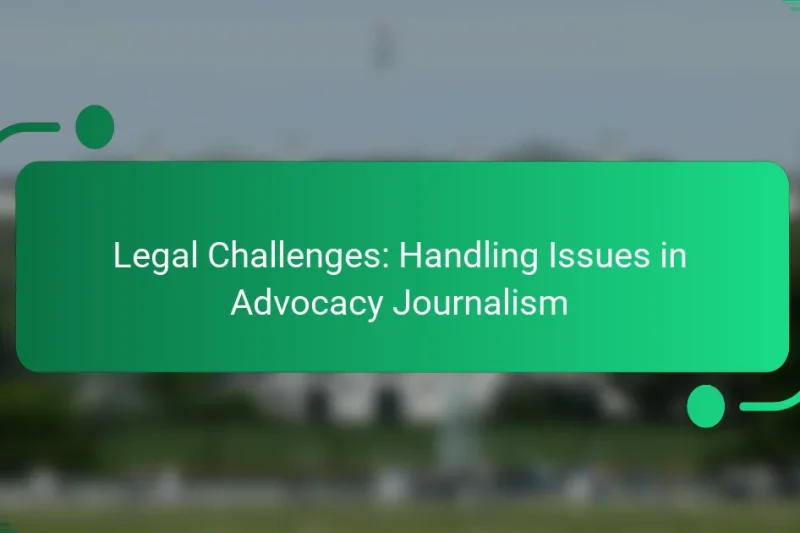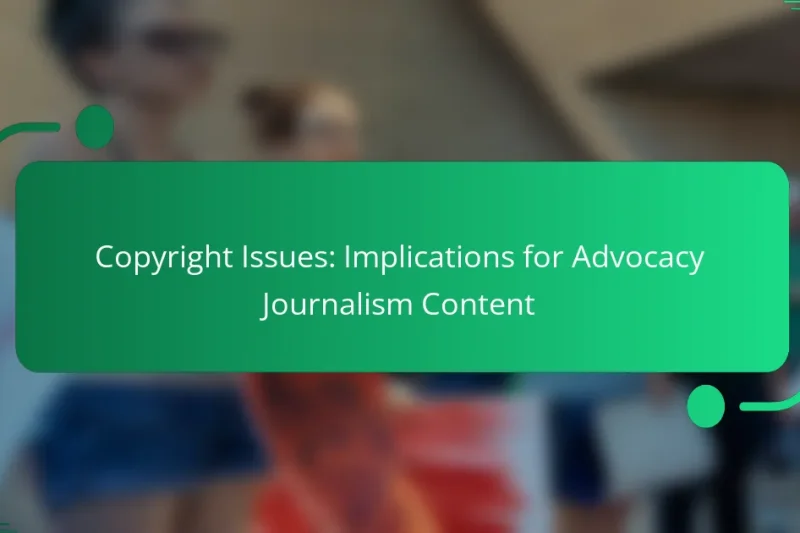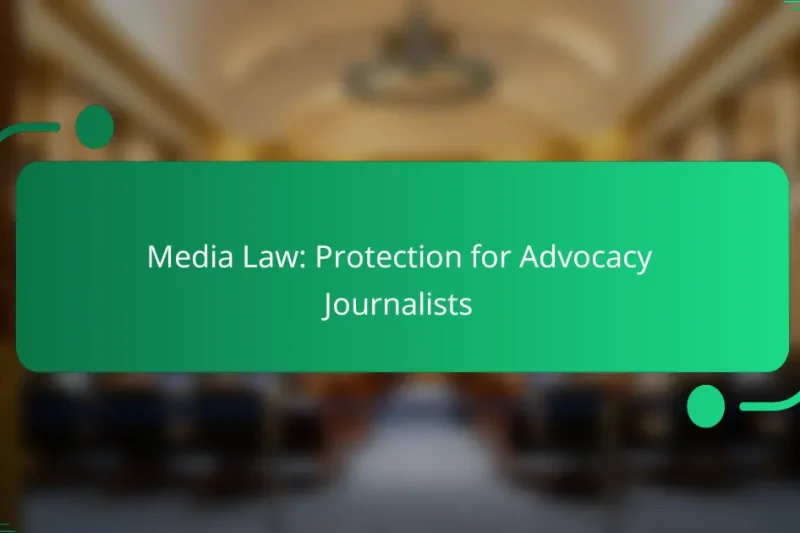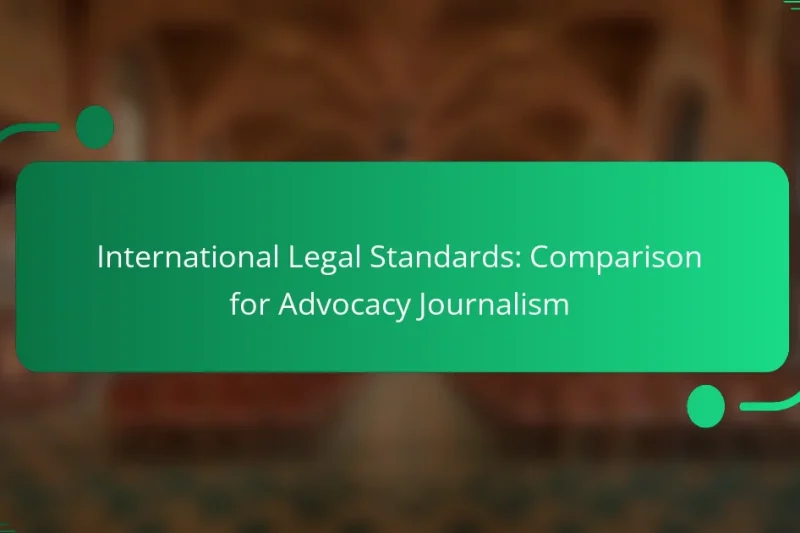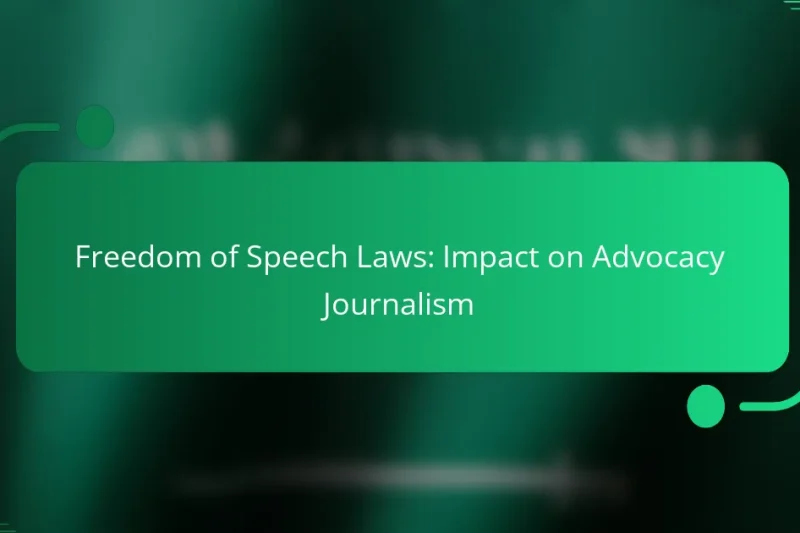Defamation laws present significant hurdles for advocacy journalism, often leading to self-censorship and hindering the reporting … Defamation Laws: Navigating Challenges in Advocacy JournalismRead more
Legal Frameworks in Advocacy Journalism
Advocacy journalism operates within a complex legal framework that includes First Amendment protections, state shield laws, and Federal Communications Commission regulations. These laws not only safeguard journalists’ rights to report on public interest issues but also impose certain ethical standards and accountability measures. As a result, the legal landscape significantly influences the methods and freedom of journalists in their pursuit of truth and transparency.
Legal Challenges: Handling Issues in Advocacy Journalism
Advocacy journalism plays a crucial role in highlighting social issues, but it often faces significant legal … Legal Challenges: Handling Issues in Advocacy JournalismRead more
Copyright Issues: Implications for Advocacy Journalism Content
Advocacy journalism faces unique challenges due to the intricate landscape of copyright laws, which can significantly … Copyright Issues: Implications for Advocacy Journalism ContentRead more
Media Law: Protection for Advocacy Journalists
Advocacy journalists in the United States are afforded essential legal protections that uphold their freedom of … Media Law: Protection for Advocacy JournalistsRead more
International Legal Standards: Comparison for Advocacy Journalism
Advocacy journalism plays a crucial role in promoting transparency and accountability, guided by key international legal … International Legal Standards: Comparison for Advocacy JournalismRead more
Freedom of Speech Laws: Impact on Advocacy Journalism
Freedom of speech laws play a crucial role in shaping advocacy journalism in the United States, … Freedom of Speech Laws: Impact on Advocacy JournalismRead more
What are the legal frameworks for advocacy journalism in the United States?
The legal frameworks for advocacy journalism in the United States primarily include First Amendment protections, state shield laws, and Federal Communications Commission regulations. These frameworks collectively support the rights of journalists to report on issues of public interest while balancing the need for accountability and ethical standards.
First Amendment protections
The First Amendment of the U.S. Constitution is fundamental for advocacy journalism, as it guarantees freedom of speech and press. This protection allows journalists to express opinions, criticize government actions, and report on controversial topics without fear of censorship or retaliation.
However, this freedom is not absolute. Journalists must navigate issues such as defamation, privacy rights, and national security concerns, which can limit their reporting. Understanding these boundaries is crucial for effective advocacy journalism.
State shield laws
State shield laws provide varying degrees of protection for journalists against revealing their sources or unpublished information. These laws help ensure that journalists can gather information without compromising their sources, which is vital for investigative reporting.
Not all states have shield laws, and the extent of protection can differ significantly. Journalists should familiarize themselves with the specific laws in their state to understand their rights and obligations when it comes to source confidentiality.
Federal Communications Commission regulations
The Federal Communications Commission (FCC) regulates broadcasting and telecommunications, impacting how advocacy journalism is disseminated through various media channels. These regulations ensure that broadcasters adhere to standards of fairness, public interest, and disclosure.
Journalists should be aware of FCC rules regarding content, advertising, and licensing, as non-compliance can lead to penalties or loss of broadcasting privileges. Staying informed about these regulations is essential for maintaining credibility and operational integrity in advocacy journalism.
How do legal frameworks impact advocacy journalism practices?
Legal frameworks significantly shape advocacy journalism by dictating what can be reported and how. These laws influence the methods journalists use to gather information and the extent of their editorial freedom.
Influence on reporting methods
Legal frameworks can restrict or enable certain reporting methods in advocacy journalism. For instance, laws regarding privacy and defamation may limit how journalists can investigate and present their findings. Journalists must navigate these regulations carefully to avoid legal repercussions while still effectively advocating for their causes.
In some countries, shield laws protect journalists from revealing sources, which can encourage whistleblowers to come forward. However, in jurisdictions without such protections, reporters may face challenges in obtaining critical information, impacting the depth and quality of their advocacy work.
Effect on editorial independence
Legal frameworks can either bolster or undermine editorial independence in advocacy journalism. In environments with strong press freedom protections, journalists are more likely to operate without fear of censorship or legal action. Conversely, restrictive laws can lead to self-censorship, where journalists avoid controversial topics to evade potential legal issues.
For example, in countries with stringent media regulations, advocacy journalists may find themselves limited in their ability to criticize government policies or corporate practices. This can dilute the effectiveness of their advocacy and reduce public accountability, highlighting the importance of a supportive legal environment for robust journalism.
What are the challenges faced by advocacy journalists?
Advocacy journalists encounter significant challenges that can hinder their work, including legal threats and difficulties accessing information. These obstacles can impact their ability to report effectively on issues that matter to the public.
Legal threats and lawsuits
Legal threats and lawsuits are common challenges for advocacy journalists, often arising from powerful entities seeking to silence dissenting voices. Journalists may face defamation claims, copyright issues, or even harassment suits aimed at intimidating them.
To navigate these threats, journalists should familiarize themselves with media law and understand their rights under the First Amendment. Consulting with legal experts before publishing sensitive content can help mitigate risks.
Access to information issues
Access to information is a critical challenge for advocacy journalists, particularly when dealing with government agencies or private organizations. Journalists may encounter bureaucratic obstacles, such as lengthy delays in obtaining public records or outright refusals to share information.
Utilizing freedom of information laws can be an effective strategy to obtain necessary data. Journalists should be persistent and prepared to appeal decisions when access is denied, as this can often lead to greater transparency and accountability.
What role do ethics play in advocacy journalism?
Ethics are crucial in advocacy journalism as they guide journalists in maintaining credibility while promoting specific causes. Adhering to ethical standards helps ensure that the information presented is accurate, fair, and responsible, balancing the need for advocacy with the public’s right to know.
Ethical guidelines from journalism organizations
Various journalism organizations, such as the Society of Professional Journalists (SPJ) and the International Federation of Journalists (IFJ), provide ethical guidelines that advocate for truthfulness, accuracy, and fairness. These guidelines emphasize the importance of verifying information before publication and disclosing any potential conflicts of interest.
For instance, the SPJ Code of Ethics encourages journalists to seek out diverse perspectives and avoid sensationalism. Following these guidelines helps maintain the integrity of advocacy journalism while ensuring that the audience receives well-rounded information.
Balancing advocacy and objectivity
Balancing advocacy with objectivity is essential for credibility in advocacy journalism. Journalists should strive to present facts and evidence while clearly indicating their stance on issues. This approach allows readers to understand the journalist’s perspective without compromising the integrity of the information provided.
A practical tip is to differentiate between opinion pieces and news reporting. In opinion articles, it’s acceptable to express strong views, but in news reporting, journalists should focus on presenting balanced viewpoints. This distinction helps maintain trust with the audience while still advocating for important causes.
How can advocacy journalists navigate legal risks?
Advocacy journalists can navigate legal risks by understanding relevant laws, seeking legal training, and consulting with legal experts. These steps help ensure that their reporting adheres to legal standards while effectively advocating for their causes.
Legal training and resources
Legal training equips advocacy journalists with the knowledge to identify potential legal pitfalls in their work. Workshops, online courses, and resources from journalism organizations can provide valuable insights into media law, copyright issues, and defamation risks.
Utilizing resources such as legal handbooks or guides specific to journalism can also enhance understanding. For instance, familiarizing oneself with the First Amendment rights in the U.S. or data protection laws in the EU can be crucial for informed reporting.
Consulting legal experts
Consulting legal experts is essential for advocacy journalists facing complex legal questions. Engaging with attorneys who specialize in media law can provide tailored advice and help navigate specific legal challenges related to their reporting.
Establishing a relationship with legal professionals can facilitate quick consultations when urgent issues arise. Journalists should consider creating a list of trusted legal contacts and ensure they are accessible, especially during high-stakes reporting projects.
What are the best practices for compliance in advocacy journalism?
Best practices for compliance in advocacy journalism include understanding local laws and implementing robust editorial policies. These practices ensure that journalists can advocate effectively while adhering to legal and ethical standards.
Understanding local laws
Advocacy journalists must familiarize themselves with the legal frameworks governing media in their region. This includes laws related to defamation, privacy, and copyright, which can vary significantly across jurisdictions.
For instance, in the European Union, the General Data Protection Regulation (GDPR) imposes strict rules on data handling, while in the United States, the First Amendment provides broad protections for free speech. Understanding these nuances helps journalists avoid legal pitfalls.
Implementing editorial policies
Establishing clear editorial policies is crucial for maintaining compliance in advocacy journalism. These policies should outline the ethical standards for reporting, including fact-checking procedures and guidelines for sourcing information.
For example, a policy might require that all claims made in articles be substantiated by credible sources, reducing the risk of misinformation. Regular training sessions for staff on these policies can further enhance adherence and accountability.
How do international legal frameworks affect advocacy journalism?
International legal frameworks significantly shape advocacy journalism by establishing guidelines for freedom of expression and press rights. These laws can either empower journalists to report on critical issues or impose restrictions that limit their ability to advocate for social change.
Comparative analysis of global laws
Different countries have varying legal frameworks that influence advocacy journalism. For instance, the European Union promotes strong protections for journalists under the Charter of Fundamental Rights, while some countries in Asia may impose strict censorship laws that hinder journalistic freedom. Understanding these differences is crucial for journalists operating in a global context.
In regions with robust legal protections, journalists can report on sensitive topics without fear of retaliation. Conversely, in countries with restrictive laws, journalists often face legal challenges, including defamation suits or imprisonment, which can deter advocacy efforts.
Case studies from different countries
In the United States, the First Amendment provides strong protections for freedom of speech, allowing advocacy journalists to cover controversial issues extensively. This legal framework has led to significant social movements being documented and supported through journalism.
In contrast, in countries like Turkey, journalists face severe penalties for reporting on government corruption or human rights abuses. The legal environment can lead to self-censorship among journalists, limiting the effectiveness of advocacy journalism in promoting accountability.
These case studies highlight the importance of understanding local laws and regulations when engaging in advocacy journalism. Journalists must navigate these legal landscapes carefully to ensure their work remains impactful and within legal boundaries.
